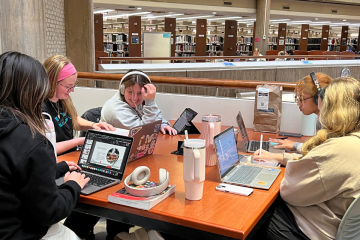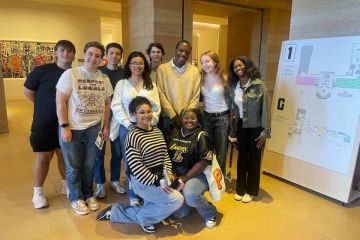Revitalized African & African American Studies Minor Launches

Ten years after the African & African American Studies (AFAS) minor launched at Widener, and following a summer of heightened national awareness surrounding racial justice and the Black Lives Matter movement, the AFAS program is getting revamped.
Co-coordinated by Jennifer Padilla Wyse, assistant professor of sociology, and Richard Cooper, clinical assistant professor of social work, the freshly organized AFAS minor is primed to not only engage students in meaningful discussion around topics of race in the classroom, but to prepare them to become humble and curious leaders able to comfortably work with a diversity of people, no matter their life and career goals.
Cooper has been academically involved in Africana Studies, hip-hop culture, cultural diversity, frameworks that liberate African Americans, and teaching about the Black Lives Matter movement for several years. He notes that the AFAS revitalization involves taking a critical lens to address structural changes in the curriculum related to intersectionality and diaspora studies, which opens up discussion on more than just the Black American experience.
But the revitalization includes more than just filling in curriculum ladders.
“It’s not strictly an academic discipline for me: it’s a cultural way of life. I’m Black. I don’t come at it all strictly from the head, it’s so much more heart and soul to me. We are talking about a field of study geared to liberate oppressed people,” Cooper said.
Wyse, who earned her PhD in Africana Studies and Sociology from Virginia Tech, has been involved in the AFAS program for a few years. She says that working with Cooper to reinvigorate the program has been a great and necessary step.
“I’m versed in this discipline but I don’t have the lived experience of Blackness, which is important because this summer as we saw the racial justice movement and reflected on the structure and leadership of the program at Widener, we knew we had some work to do,” she said.
Preparing Intersectional Leaders
The minor involves the completion of Introduction to African & African American Studies plus a selection of five electives from a wide range of courses in psychology, sociology, English, French, history, and more.
“These courses all center the Africana experience, but within that experience we’re talking about men and women, folks with different sexualities, folks in different classes, those of differing nationalities, and all that gets at the intersectionality aspect. Yes, Black folks share their race in common, but we are recognizing that they are not this homogenous group of people,” Wyse said.
The AFAS program will also be hosting virtual events next semester as well as collaborating with other universities with similar minors to create meaningful programming.
Both Cooper and Wyse note that the proliferation of Black studies, as well as Gender, Women & Sexuality Studies; Chicano studies; and other studies of historically oppressed groups, all came about from student social protest. In a similar way, listening to the needs and interests of students and student groups in the wake of a summer of prolific violence against Black people is vital to infusing new life blood into the program.
We’re looking to bring about a new era because the dominant discourse often gets called normal without a subtitle, so with the AFAS minor, we hope to broaden and deepen our thinking at Widener and provide opportunities for points of view that aren’t typically heard. —Richard Cooper, clinical assistant professor of social work
This broadened thinking creates the foundation for strong leadership.
“The word ‘leadership’ implies the ability to maneuver, relate to, engage with, and bring a cultural humility to your interactions,” he added. “Students should be exposing themselves in different ways of knowing, being, and understanding the world because it helps you to better relate to diverse groups and solve problems in ways you would not have considered had you not been made aware of various cultures, beliefs, and value systems.”
Empowering Everyone
Despite students’ racial identity, Wyse notes that this minor has something for everyone.
I make the argument that if you’re not of African descent, this is a field that will curate your intellectual curiosity, because once something flicks in your mind and you think ‘I never realized that was an experience Black people had,’ it keeps happening. —Jennifer Padilla Wyse, assistant professor of sociology
“It also facilitates the ability for people to work in diverse settings in a collaborative, equal way. You might be the manager of a team having to facilitate discussions, or you might be working on a marketing project and you have to know who you’re marketing to and you don’t want to offend people.
For people who identify as Black, Wyse said she thinks Africana studies provides an intellectual, theoretical reflection on lived experiences. Some students may have gone through high school learning about history through the lens of white scholars. Widener’s program will expose them to the lens of scholars who have the wisdom of living the Black experience, which can be empowering, she said.
Cheyenne Silva, a junior double psychology and sociology major, just declared her AFAS minor this semester. She says after following events of racial violence and subsequent protest this summer, she became interested in diving into issues of race, especially as she looks forward to a career in clinical psychology.
“In the future I’ll be working with clients of all different backgrounds, so gaining this knowledge will be beneficial as I work to help people,” Silva said.
She’s looking forward to taking classes in multicultural psychology, Black Lives Matter, and race relations in American society to gain new perspectives that broaden her outlook.
“Everybody gets an education in whiteness in school, but we just refer to it in terms like ‘history,’ not ‘white history.’ If you’re not a person of color it’s just blind to you, you don’t think about it, so I think having this minor will open up my eyes to other experiences,” she said.
Email for more information on declaring a minor in African & African American Studies:



